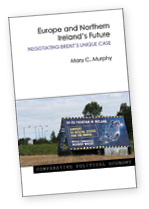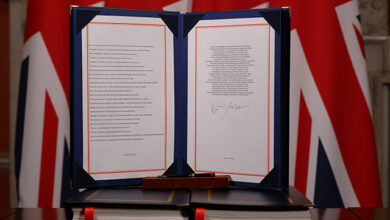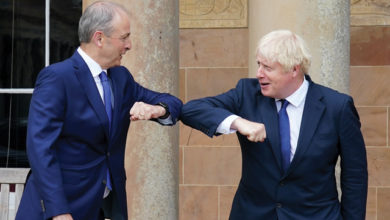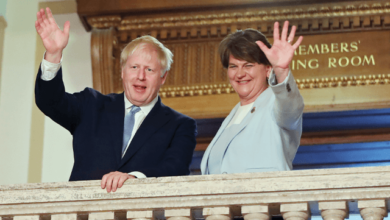Northern Ireland after Brexit: ready or not?


As the battle to avoid a chaotic exit intensifies, how ready is Northern Ireland for a future outside the EU? University College Cork’s Mary C Murphy writes.
The October European Council Summit is being billed as the big Brexit showdown – the moment when the terms of the UK’s Withdrawal Agreement will be finalised and a deal on the future UK-EU relationship will be sealed. This will set the scene for ‘Brexit Day’ on 29 March 2019 when the UK is scheduled to leave the EU.
In Northern Ireland, the EU referendum was a pretty lacklustre affair. Four of the five main political parties campaigned for Remain. The largest political party, the Democratic Unionist Party (DUP), was pro-Leave. Although on the right side of the overall UK referendum result, the DUP position was at odds with the result in Northern Ireland where 56 per cent of voters chose Remain.
The subsequent UK-EU negotiations have occurred against the backdrop of a political vacuum in Northern Ireland. Less than seven months after the referendum result and just over two months before Article 50 was triggered, the Northern Ireland devolved administration collapsed in a mire of political accusations around DUP leader Arlene Foster’s role in the administration of the Renewable Heating Incentive (RHI) scheme.
The prolonged period of institutional stasis which followed has undermined political relationships and produced an atmosphere of mistrust and antagonism. It has also meant no functioning Northern Ireland Assembly, no North-South Ministerial meetings, and no Northern Ireland representation at British-Irish Council summits. Discussion and debate about the complex and multi-faceted consequences of Brexit for Northern Ireland has been deficient.
There is disagreement too about the precise implications of Brexit for Northern Ireland. The DUP views Brexit through a less negative lens than do the Irish Government and nationalist political parties. For Northern Ireland’s largest unionist political party, Brexit is more opportunity than threat. For nationalists, Brexit is seen as economically and politically problematic.
The lack of consensus about the consequences of Brexit for Northern Ireland extends to a lack of cross-party agreement about how to protect Northern Ireland interests post-Brexit. The EU has been categorical in its insistence that no hard border is established between Ireland and Northern Ireland. However, as of yet, there is no adequate formula for achieving this, unless the UK remains within the EU’s customs union and single market.
“Politically rudderless, and reliant on a DUP-supported Conservative Party government which is rife with division, Northern Ireland sits on the side-lines as its future is negotiated by others.”
Staying within the EU’s orbit may well be acceptable to a majority in Northern Ireland, including a majority within the DUP. However, Northern Ireland’s future status is a hostage to the vagaries of internal Conservative Party politics where Brexit is the subject of epic contestation. The Confidence and Supply Agreement between the DUP and Conservative Party, which gives some leverage to the smaller party, also muddies the Brexit waters.
So, what now for Northern Ireland? Politically rudderless, and reliant on a DUP-supported Conservative Party government which is rife with division, Northern Ireland sits on the side-lines as its future is negotiated by others.
There is a certain poignancy here. When Northern Ireland emerged from the shadow of violence and intense political instability to agree the 1998 Belfast/Good Friday Agreement, progress was won on the back of multi-party talks where the Irish and British governments played supporting roles. Imperfect it may be, but this peace accord was a turning point in nudging Northern Ireland along the road towards sustainable peace and functioning devolved governance. There have been sporadic interruptions and community relations remain unstable, but Northern Ireland is a fundamentally different and better place today.
The involvement of the Northern Ireland political parties in the talks process which preceded the 1998 Agreement produced a formula for the future which was agreed on the basis of compromise and consensus. And crucially, all those who were party to the negotiations had a stake in the success of the agreed outcome. They were motivated to make the Agreement work because they had played a role in its design.
That same Agreement provides a strong institutional basis for re-creating constructive cross-party dialogue. The breakdown of relations between Sinn Féin and the DUP however, has closed off the possibility of Northern Ireland finding its collective voice and feeding positively into the UK’s Brexit position. The absence of strong Northern Ireland input becomes all the more troubling as the prospects of a hard Brexit or no deal Brexit loom larger than ever before.
Conservative Party resignations, the excruciating passage of Brexit legislation through Westminster, and a warning from the Governor of the UK Central Bank highlight how fraught and fragile the Brexit process has become.
The recent UK in Changing Europe Brexit Policy Panel survey underlines a sense of pessimism and reveals that 64 per cent of academic experts think it is unlikely there will be a deal after the October European Council. The UK crashing out of the EU is now a distinct possibility, and make no mistake about it, Northern Ireland will be profoundly challenged by the ensuing turmoil.
Without a functioning devolved government, Northern Ireland’s ability to anticipate, prepare and plan for any sort of Brexit is severely handicapped. In the event of a hard Brexit or no deal Brexit, the lack of local contingency planning about how to manage a whole swathe of complex public policy challenges is hugely problematic.
Even if the process of UK withdrawal from the EU is smooth, there are decisions to be made about if and how Northern Ireland might relate to the EU after Brexit. Without a functioning Northern Ireland Assembly and Executive, there are limits to how much this vital work can be pursued.
There is an increasingly strong sense that the UK will depart the EU on 29 March 2018. The UK in a Changing Europe Brexit Policy Panel survey reported that 83 per cent of experts believe that the UK will leave the EU on that date.
With just months to go until ‘Brexit Day’, the time for Northern Ireland’s elected representatives to confront complex and potentially transformative future challenges is seriously long overdue.
 Dr Mary C. Murphy is lecturer in politics in the Department of Government and Politics at University College Cork and holds a Jean Monnet Chair in European Integration. She is the author of Europe and Northern Ireland’s Future: Negotiating Brexit’s Unique Case, London: Agenda Publishing.
Dr Mary C. Murphy is lecturer in politics in the Department of Government and Politics at University College Cork and holds a Jean Monnet Chair in European Integration. She is the author of Europe and Northern Ireland’s Future: Negotiating Brexit’s Unique Case, London: Agenda Publishing.





